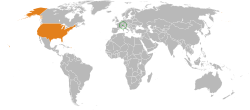Switzerland–United States relations
 |
|
Switzerland |
United States |
|---|---|
Switzerland–United States relations are bilateral relations between Switzerland and the United States.
According to the 2012 U.S. Global Leadership Report, 49% of Swiss people approve of U.S. leadership, with 31% disapproving and 20% uncertain.[1]
Diplomatic relations
The first official U.S.-Swiss consular relations were established in the late 1820s. Diplomatic relations were established in 1853 by the U.S. and in 1868 by Switzerland. The U.S. ambassador to Switzerland is also accredited to Liechtenstein.
The U.S. Embassy in Switzerland is in Bern. The U.S. Mission to the European Office of the United Nations and other International Organizations, the U.S. Mission to the WTO, and the U.S. Delegation to the Conference on Disarmament are in Geneva. America Centers and Consular Agencies are also maintained in Zurich and Geneva.
As of June 2014, the U.S. ambassador to Switzerland is Suzan “Suzi” LeVine, and as of 2010 the Swiss ambassador to the U.S. is Manuel Sager.
Moreover, Switzerland acts as the protecting power for relations and interests between the U.S. and Iran as the United States does not maintain relations with Iran since the Iranian Revolution. Between 1963 and 2015, Switzerland acted as the protecting power between Cuba and the United States, until the embassies were re-established in Havana and Washington, DC.
Bilateral agreements
The first 4 years of cooperation under the U.S.-Swiss Joint Economic Commission (JEC) invigorated bilateral ties by recording achievements in a number of areas, including consultations on anti-money laundering efforts, counter-terrorism, and pharmaceutical regulatory cooperation; an e-government conference; and the re-establishment of the Fulbright student/cultural exchange program.
The United States and Switzerland signed three new agreements in 2006 that will complement the JEC. The first of the new agreements is the Enhanced Political Framework and was signed by Under Secretary of State for Political Affairs Nicholas Burns and Swiss State Secretary Michael Ambühl. The second agreement is the Trade and Investment Cooperation Forum and was signed by then-U.S. Trade Representative Rob Portman and then-Economics and Trade Minister Joseph Deiss. The last agreement is the revised Operative Working Arrangement on Law Enforcement Cooperation on Counterterrorism and was signed by U.S. Attorney General Alberto Gonzales and then-Swiss Justice Minister Christoph Blocher.
In February 2013, the Swiss Federal Council allowed for the signing of the Foreign Account Tax Compliance Act (FATCA) with the US. These agreements force all Swiss banks to inform the Internal Revenue Service of undeclared, off-shore accounts. These new regulations will be applicable by 2014, and in turn assure Swiss banks of continued operations within the US.[2]
In July 2015, Switzerland and the United States signed an organic food equivalency agreement; any product certified as organic in one country may be sold as organic in the other.[3]
See also
Notes and references
![]() This article incorporates public domain material from the United States Department of State website http://www.state.gov/r/pa/ei/bgn/index.htm (Background Notes).
This article incorporates public domain material from the United States Department of State website http://www.state.gov/r/pa/ei/bgn/index.htm (Background Notes).
- ↑ U.S. Global Leadership Project Report - 2012 Gallup
- ↑ Das Abkommen zwischen der Schweiz und den USA zum US-Steuergesetz FATCA ist unterzeichnet. (in German). Blick.com Wirtschaft. Retrieved 26 May, 2013.
- ↑ Jones-Ellard, Sam (9 July 2015). "United States and Switzerland Streamline Organic Trade". usda.gov. United States Department of Agriculture. Retrieved 18 July 2015.
External links
| Wikimedia Commons has media related to Relations of Switzerland and the United States. |
- History of Switzerland - U.S. relations
- Swiss American Historical Society
- Embassy of the United States Bern, Switzerland at Google Cultural Institute

.svg.png)